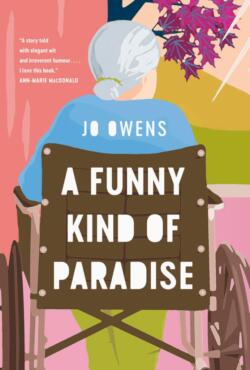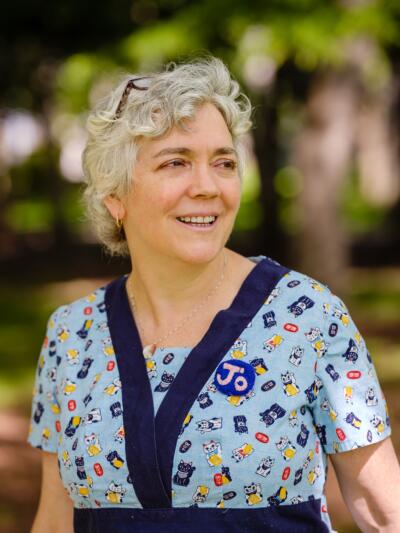1516 Memories and caregivers
A Funny Kind of Paradise
by Jo Owens
Toronto: Penguin Random House Canada (Random House Canada), 2021
$22.95 / 9780735278820
Reviewed by Ginny Ratsoy
*
 An extended care facility in Victoria might seem a claustrophobic setting for a novel, particularly when a stroke has rendered speechless its narrator, Francesca, who inhabits a room with four other patients, but A Funny Kind of Paradise defies expectations in its expansiveness. As she spotlights two marginalized groups – the infirm elderly and those who perform their basic care – Jo Owens surprises readers with a light, graceful touch, rather than the pathos-laden one we might expect.
An extended care facility in Victoria might seem a claustrophobic setting for a novel, particularly when a stroke has rendered speechless its narrator, Francesca, who inhabits a room with four other patients, but A Funny Kind of Paradise defies expectations in its expansiveness. As she spotlights two marginalized groups – the infirm elderly and those who perform their basic care – Jo Owens surprises readers with a light, graceful touch, rather than the pathos-laden one we might expect.
The narrative stance is deftly handled, impressive considering Owens is a novice writer. In a loose adaptation of the epistolary form, Francesca “reports” her thoughts to her dearest friend Anna, who has died of cancer – alternately relaying the present-day quotidian details of life at the home and replaying her own life, particularly her adult life as a single parent and Anna’s role in it. In the present narrative thread, Francesca, whose right side is severely impaired and who is fed through a tube, is as much spectator as participant, and after a year of becoming accustomed to her condition, she is capable of some measure of detachment — as accepting of being apart from the action as she is being part of it. Despite her physical shortcomings (or perhaps because of them) she is often able to distance herself from her surroundings and treat with amusement that which a lesser character might find overwhelming. The thread relaying memory is convincingly episodic and more emotive: shot through with love for her two children (Christian, who maintains a positive presence in his mother’s life in the facility, and Angelina, who was a troubled youth and whose whereabouts are currently unknown to her family) and her best friend. Regret also tinges her memories; above all, she is remorseful for having buried herself in her career as a small business accountant, at the expense of the three people most dear to her. As she works through her past, with Anna as her ghostly sounding board and Christian, the care workers and her fellow patients providing present comfort, Francesca symbolically rights wrongs through her present actions.

Owens’ own 20-year plus career as a care worker does not seem to have cooled her passion for the work – or admiration for her colleagues. In Owens’ hands, the everyday care givers are magicians, capable of accurate multitasking and carrying on intricate conversations at the same time as they evince respect for their patients. Through the dialogue that Francesca reports, the material conditions of their job are thoroughly explored. In addition to jumping hoops to move from part-time and casual to full-time with benefits, and coping with shift work, they must provide highly individuated care to patients with varied and complex needs resulting from cancer, dementia, and diabetes, for example. Despite these challenges, the dialogue between pairs of workers reveals to Francesca and the reader that their facility is ideal compared to others – less crowded and better staffed and equipped. The workers are grateful for this, and so, too, is Francesca. In an important caveat that follows the novel proper, Owens acknowledges two major liberties she has taken to transform the experience to fiction: her care workers talk shop in front of the residents (a practice prohibited in reality) and the five-bed room in which Fran resides would not, in actuality, be as harmonious as it is in the novel.
In 2022, when the proportion of Canadians aged 65 or older has reached an all-time high, and when ageism is a reality – despite the lip service paid to improving the lot of those in care during the earlier stages of the pandemic – Jo Owens’ A Funny Kind of Paradise is an important addition to an all-too-small body of fiction devoted to the study of the infirm elderly and those who attend to them.
*

Ginny Ratsoy is Professor Emerita at Thompson Rivers University. Her scholarly publications (co-authored and edited and co-edited books and numerous peer-reviewed articles) have focused on Canadian fiction, theatre, small cities, third-age learning, and the scholarship of teaching and learning. In addition to counteracting ageism by maintaining a growth mindset through freelance writing and community engagement, she promotes third-age learning through her involvement as a board member, instructor, and coordinator for the Kamloops Adult Learners Society. Editor’s note: Ginny Ratsoy has recently reviewed books by Iona Whishaw, Mark Bulgutch, Ron Base & Prudence Emery, Maureen Brownlee, Maria Reva, and Elizabeth Haynes for The British Columbia Review.
*

The British Columbia Review
Publisher and Editor: Richard Mackie
Formerly The Ormsby Review, The British Columbia Review is an on-line journal service for BC writers and readers. The Advisory Board consists of Jean Barman, Wade Davis, Robin Fisher, Cole Harris, Hugh Johnston, Kathy Mezei, Patricia Roy, Maria Tippett, and Graeme Wynn. Provincial Government Patron (since September 2018): Creative BC. Honorary Patron: Yosef Wosk. Scholarly Patron: SFU Graduate Liberal Studies.
“Only connect.” – E.M. Forster
6 comments on “1516 Memories and caregivers”